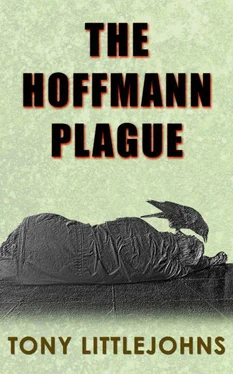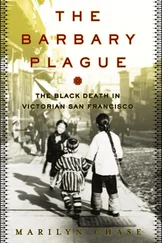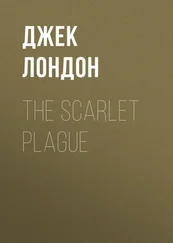This new variant, however, was pneumonic, with no initial bubonic stage. It started in the respiratory system and was airborne from the outset, spreading rapidly. It was a mutation unlike anything they’d seen before and proved completely resistant to all available antibiotics. The medical community was at a complete loss to know what to do about it; though, of course, they didn’t make that public. The mortality rate was virtually a hundred percent and death occurred within thirty-six to forty-eight hours after symptoms developed. Those who looked at first like they might fight it and survive soon slipped into a coma, from which few recovered. There had been much written in recent years about the growing ineffectiveness of antibiotics, and how so many bacteria were becoming resistant to them.
Information got leaked to the press and by the second week one of the tabloids had labelled it “The Hoffmann Plague”. Before they fully realised the implications and seriousness there were lurid headlines like “HOFFMANN PLAGUE: THE NEW BLACK DEATH!”, “PLAGUE IN THE UK!”, and other similar things.
Initially they estimated its R 0 (“R-nought”) figure – the basic reproductive number – to be between one-point-three and two-point-five, using previous models for pneumonic plague; for which there wasn’t a huge amount of data. But infections and deaths were occurring so quickly in so many different locations that it was obviously much higher than that. They soon had to revise their figure and estimated that it was higher than smallpox, which was six or seven, but it was difficult to give an accurate number. That meant that a contagious person was likely to infect another six or seven people – or even more if their estimate was low. It depended on many factors; how strong people were, their movements and contact with others, and their ability to get around before they succumbed to the disease.
What was strange was that the incubation period seemed to vary from person to person before the main symptoms developed; anywhere between two and seven days. That meant that a person could be contagious and not realise they’d contracted it. People touch their faces many times an hour, then transfer those bacteria onto any surface they touch, ready for the next person to pick up the bacteria and become infected. People would also be sneezing and coughing from colds and other viruses as well as from the plague, spreading the bacteria to all in their vicinity.
It soon became obvious that this wasn’t just scaremongering or sensationalist reporting by the tabloids about bird flu or Ebola that had occurred in recent years. This was real; it was happening here and now in the UK and was spreading incredibly quickly around the country. He’d spoken to a friend in Scotland towards the end of the second week, who had told him the emergency services and hospitals were already struggling to deal with the number of cases and all the bodies. By then, many hundreds of deaths had also occurred in London, Manchester, Birmingham, Leeds and Sheffield, with many thousands more showing symptoms.
At the end of that phone call he’d made a decision: he knew that Bexhill-on-Sea wasn’t exactly a thriving metropolis or a major hub for nationwide travel, but it was only two hours’ drive from London and the plague would surely reach there soon. He’d sat down and made a list of all the things he might need for survival in the short and long-term, and withdrew all his money from the bank. Over the next week he made many visits to all the supermarkets, food stores, pharmacies, hardware and camping shops in the area. He bought as much canned and dried food as he could fit in his car at each visit, along with all the bottled water he could get, earning him some strange looks from people at the supermarkets. He didn’t care; he’d rather be safe than sorry. He also couldn’t believe that more people weren’t doing the same as him yet. He had the conversation with his brother, but his opinion was that they’d soon develop a vaccine and it would blow over.
He bought extra torches and large quantities of batteries, all the candles that he could find, and many water filters and purification tablets. He bought extra containers to store rainwater in – dark ones to prohibit the growth of mould and fungus – and jerrycans of petrol for his camping stove and lantern, along with tins of butane gas and a couple of camping stoves. He even remembered to get another bow saw and extra blades for cutting wood. He thought that gas and electricity might not last long, so he had to have means of cooking and boiling water. The chimenea on the patio of his small courtyard would serve as a usable barbeque and he could easily rig up a tarp for protection from the rain. He already had enough general tools to get by. As an afterthought he also bought a large quantity of disposable plates, bowls and cutlery as he didn’t want to waste precious water for washing dishes. By the end of that week his flat was almost full; the long hallway was stacked floor-to-ceiling with everything he’d bought. He went over his lists again to see if he’d forgotten anything.
In the following weeks he’d stayed indoors the whole time, having made sure all the windows and doors were closed properly and locked. And then it came. Gradually at first, but rapidly increasing in frequency, he heard the effects of the plague as it spread like wildfire through the town, causing terror and chaos: muted somewhat by his double-glazed windows but frighteningly apparent. Frequently he would hear the chilling screams of people in pain or anguish from nearby houses and sometimes out in the streets. The cries of children were hardest to bear and he was often in tears. Police and ambulance sirens were a constant occurrence. Often there was the sound of people running down the road, of shouting, or of breaking glass. Once there was the frantic ringing of his doorbell and banging on his door; he didn’t dare to go to the door, but stayed in the kitchen with the rolling-pin in his hand.
All he could do was try to close his ears to it all and sit there terrified. He felt horrified at the suffering going on around him, and also a bit guilty: unable to help anyone or do anything. It seemed to go on for ever before gradually becoming quieter in the following weeks.
Occasionally he thought of things he’d neglected to get, which he wrote down, thinking to go out when it might be safer. He had a stock of disposable dust masks to put on for when he did need to go out; that had been the medical advice that was broadcast on the news. The problem, though, was that the masks soon became damp from exhalation, especially in the cold weather, quickly rendering them ineffective. The medical broadcasts didn’t mention this, but there was nothing else they could do. The general advice was to stay indoors and have no interaction with other people, but how could that work in the real world?
He had trouble remembering the exact timescale now, but his last phone-call had been with his brother, who’d lived just over a mile away in Sidley, on the northern edge of Bexhill. Dave had rung him in tears to say that his son and daughter had died in Eastbourne, and that he and his wife now had the symptoms as well. His brother had implored him to keep away and to stay indoors, even though he had wanted to go round to see him. Their mother and sister in London had already died two weeks earlier and he was still reeling from the shock and grief of that, along with the deaths of his nieces on his sister’s side. It had been a relatively short conversation, filled with tears. There wasn’t much to be said, really. What can you say to someone who will be dead in a day or two, apart from that you love them? He’d come off the phone and broken down, sobbing uncontrollably and cursing. He couldn’t even go to see his brother one last time to hug him and tell him that he loved him.
Читать дальше












